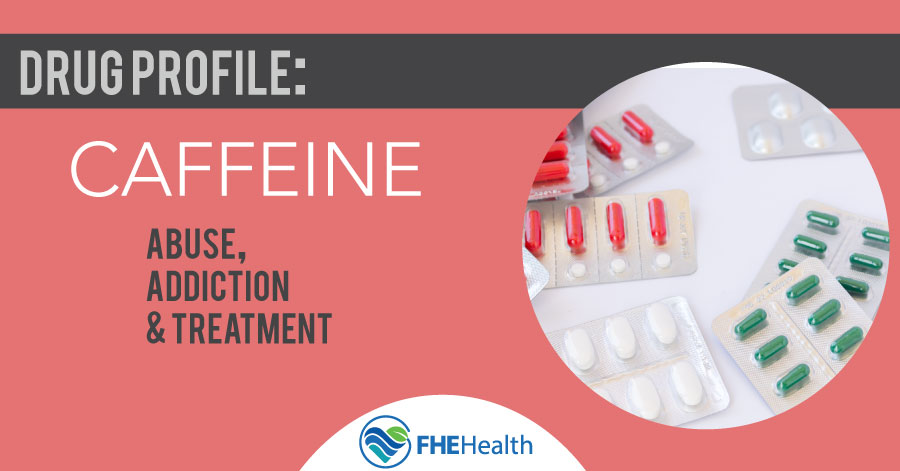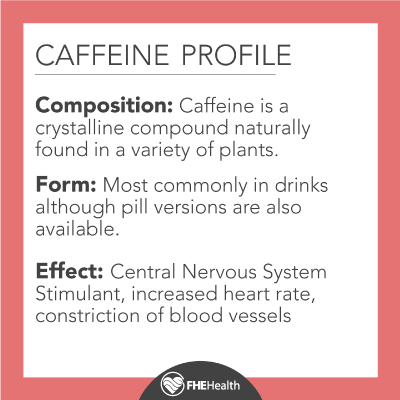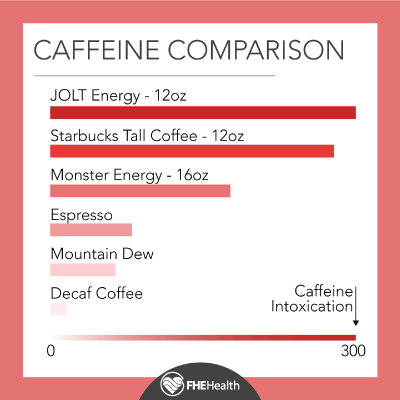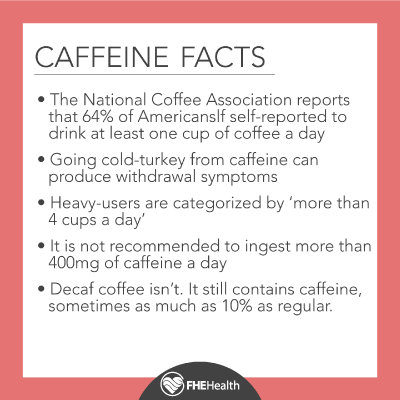
The majority of us have coffee every day, so it can be easy to forget that the caffeine it contains has some potentially harmful side effects. Keep reading to understand why caffeine is a drug you should think twice about abusing.
Do you reach for a cup of coffee once a day, or do you drink it all day long? Depending on the type of caffeine you consume and the amount of stimulant in it, you could create negative health effects for yourself if you use it on a long-term basis. In many ways, caffeine is a drug that needs to be carefully managed.
Is Caffeine a Drug?
 Caffeine is a type of stimulant. That means coffee, energy drinks and other types of caffeine-rich foods speed up the messages that travel between the body and the brain. Caffeine, which is found in many leaves, nuts, and seeds from plants, can make you feel like you have lots of energy, but excessive amounts can cause health complications for many people.
Caffeine is a type of stimulant. That means coffee, energy drinks and other types of caffeine-rich foods speed up the messages that travel between the body and the brain. Caffeine, which is found in many leaves, nuts, and seeds from plants, can make you feel like you have lots of energy, but excessive amounts can cause health complications for many people.
Most of the caffeine drinks and foods you consume are safe as long as you consume them in moderation. But when your body gets too much stimulant, it can mimic the effects of a drug overdose.
How Is Caffeine Like Other Drugs?
The number of people drinking coffee in the United States is on the rise. According to the National Coffee Association’s industry report, 64 percent of people drank at least one cup of coffee a day in 2018. That’s up from 62 percent in 2017. Many of these adults report “needing” coffee to get through the day. Does the body really need this type of stimulant to make it function properly?
That’s not exactly what’s happening. Rather, those who consume large amounts of coffee, tea, energy drinks or foods high in caffeine typically develop a dependency on it. This caffeine high is evident when a person who drinks routinely simply stops. Going cold turkey like this can create some negative side effects, such as headaches, lethargy or feeling unfocused.
No one wants to experience these symptoms, but they pale in comparison to what someone addicted to a substance such as heroin or cocaine experiences when they try to stop using. In true drug addiction, withdrawal symptoms are debilitating and painful. That’s not quite the level of what caffeine can do to your body. Nevertheless, its habitual use can be compared to that of other drugs.
Caffeine as a Stimulant
Drugs are typically categorized into two types: stimulants and depressants. Caffeine is a stimulant because it wakes up your brain and nervous system. It triggers the circulation of adrenaline and cortisol in your body, causing you to feel alert. If taken in appropriate amounts, caffeine can help an individual feel focused, refreshed and energized. However, if abused and taken in significant quantities, caffeine can lead to feelings of anxiety, insomnia and “crash and burn” periods.
What Are the Negative Effects of Caffeine on the Body?
The impact of caffeine on the body isn’t fully understood, but researchers are finding increasing risks to heavy users. In a study by the University of Colorado at Boulder, (published in the journal Neuropsychopharmacology by neuroscientists) University of Colorado researchers found that long-term caffeine consumption during teen years — from ages 9 to 17 — can enhance the sensitivity of the adu
Putting this link aside, there are other negative effects of caffeine on the body. They include, according to the Alcohol and Drug Foundation, the following:
- Anxiety and irritability
- Restlessness and dizziness
- Headaches and an inability to concentrate
- Stomach pain
- Dehydration
- Faster breathing rate
- Faster heart rate
The long-term effects are a bit more worrisome. Heavy use, according to the foundation, is having more than four cups of coffee a day (or the equivalent in energy drinks). In these situations, people may experience:
- Muscle tremors
- Rapid heart rates
- Irregular heart rates and rhythm
- Low blood pressure, putting a person at risk of fainting
- Seizures
- Confusion leading to delirium
Can Caffeine Overdose Occur?
A large amount of caffeine consumed in a short period of time can create a caffeine overdose. This is not uncommon with caffeine anhydrous, which is a highly potent caffeine product in a powder form. Often used as a way to lose weight quickly or to improve athletic performance, caffeine anhydrous can crease the risk of potentially fatal overdoses. That’s because it is the equivalent of drinking 28 cups of coffee.
Caffeine overdose can occur in other situations as well. A large amount of caffeine consumed quickly can cause:
- A very fast heart rate
- Confusion
- Panic attacks
- Tremors
- Nausea and vomiting
- Seizures
Can You Get a Caffeine High?
It’s possible to get a high-like feeling from consuming a large amount of caffeine or if you are drinking caffeine on a routine basis. You don’t have to drink it throughout the day, but even just a cup or two each day can create a level of dependency. After a cup of coffee, you feel more energized or even have a sense of euphoria.
How Caffeine Is Abused
All stimulants provide a sudden surge of energy, which eventually tapers off. If you particularly enjoyed the feeling gained from that rush of adrenaline, you may be tempted to go after it again and again. As a result, you may have a lot more caffeine in a day than is healthy. Additionally, you can start to experience caffeine withdrawal, making overconsumption more likely. Along with a regular coffee addiction, many people develop a soft drink or energy drink addiction. Long-term abuse of caffeine can have serious consequences.
The FDA recommends a maximum of 400 milligrams of caffeine per day for a healthy adult to avoid adverse side effects. Of course, this is a general number and needs to be adjusted for each person. Many people find themselves ultrasensitive to even a small amount of caffeine.
The majority of Americans consume less than 400 milligrams per day. However, some individuals may be unintentionally consuming more caffeine than they realize. This could be due to misunderstanding how much caffeine is in some desserts, energy drinks, sodas or other products.
How Much Caffeine Is Okay?
It’s recommended that adults consume no more than 400 milligrams of caffeine per day. Here’s a look at what’s in a typical drink according to the Center for Science in the Public Interest:
- Starbucks coffee, blonde roast, 20 ounces: 475mg
- Brewed black tea, 14 ounces: 47mg
- Typical soft drink, 12 ounces: 71mg
- 5-Hour Energy, 2 ounces: 200mg
- Bang Energy, 16 ounces: 357mg
If you consume more than the allotted 400mg a day, you may notice withdrawal symptoms. This could be an indication that it’s time to look for help for this type of substance use disorder.
Caffeine Combined With Other Substances
As is the case with all drugs, it’s dangerous to mix caffeine with other stimulants. Most notably, mixing alcohol and caffeine is a common problem. In the past year, drink combinations such as Four Loko, Red Bull and Vodka or Jägerbomb —Jägermeister with Red Bull — were popular. Most bars have now stopped serving these drinks together. Four Loko had to change its formula to no longer include caffeine.
Most notably, mixing alcohol and caffeine can delay the effects of impairment. The stimulating effect of caffeine can overcome the depressant impact of alcohol. This can make a person feel more alert than they are, so they continue to drink past a responsible amount.
Is Caffeine Addictive Enough for Treatment?

Most people don’t need long-term treatment for caffeine addiction. However, for those who consume a significantly higher amount than recommended or who can’t make it through the day without energy drinks, getting help can be important. Detoxing in a medically prepared facility can help ensure the best possible outcome. Although you likely will not need supplemental detox medication, monitoring vitals and treating symptoms is the most comfortable way to come off any drug.
Some people may need more help, especially long-term caffeine users. If so, substance abuse programs can provide you with the support you need.
Are You Addicted to Caffeine? Let FHE Health Provide Help
If you have any type of substance use disorder, our team at FHE Health may be able to help you. Whether you’re addicted to caffeine or other stimulant drugs, our goal is to help you live a drug-free life. Contact us to learn more about our drug and alcohol rehab services.






